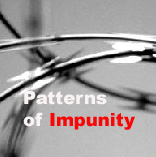VIOLATION OF
RULE OF LAW - 1982
"Everyone has the right to an
effective remedy by the competent national tribunals
for acts violating the fundamental rights granted him
by the constitution or by law" - Article 8 of the
Universal Declaration of Human Rights
 "During the
campaign for the December 1982 referendum to extend the
life of Parliament without a general election, a
Superintendent of Police seized 20,000 pamphlets of
'Voice of the Clergy' opposing the referendum proposal.
A Buddhist monk, the secretary of the organisation
concerned, complained to the Supreme Court, under
Article 126 of the Constitution, that this act had
infringed his fundamental right to freedom of speech
and expression. (The Pavida Handa Case in which S.Nadesan
Q.C. appeared for the petitioner
complainant)
"During the
campaign for the December 1982 referendum to extend the
life of Parliament without a general election, a
Superintendent of Police seized 20,000 pamphlets of
'Voice of the Clergy' opposing the referendum proposal.
A Buddhist monk, the secretary of the organisation
concerned, complained to the Supreme Court, under
Article 126 of the Constitution, that this act had
infringed his fundamental right to freedom of speech
and expression. (The Pavida Handa Case in which S.Nadesan
Q.C. appeared for the petitioner
complainant)
On 28th February 1983, the Supreme Court held in his favour, and
awarded 10,000 rupees damages against the
Superintendent personally, together with costs. On the
2nd March 1983, the Government announced that the
Superintendent would be promoted, and that the state
would pay the damages and costs
That history soon repeated itself... On 8th March 1983,
a former M.P., together with some others, went to
deliver a letter of protest to the American Embassy in
Colombo, where she was received courteously... On their
way back, some police officers took away their
banners...soon after (she) found herself under arrest,
thrown to the floor and kicked. She too complained to
the Supreme Court under Article 126 about an
infringement of her fundamental rights...it (the
Supreme Court) found that the arrest was unlawful and
directed the Inspector General of Police to conduct
further inquiries... That judgment was delivered on the
8th of June 1983. On the following day, the Acting
Inspector General of Police announced the promotion of
the sub-inspector who arrested her..
Two days after that, two of the Judges of the Supreme
Court who had heard this case found their private
houses surrounded by unruly mobs, shouting obscenities
at them...It was a frightening experience, and no
policemen was in sight. They tried to telephone the
police , but found the lines mysteriously out of order
...and although the mobs arrived in public service
buses and the disorders had clearly been organised in a
concerted fashion, no one seems to have managed to this
day to unearth anyone responsible: apparently, the
relevant records of the bus station concerned have
somehow been lost...
Such events are hardly calculated to encourage the
judiciary to remain independent, or to enhance public
respect for its members, their judgments, or the rule
of law...
The President freely conceded that he had personally
ordered the promotion of the two police officers (in
June 1983), and the payment out of public funds of the
damages and costs. This he said had been necessary to
maintain police morale...at a time when he found the
Supreme Court a hindrance to some of his policies...
The conclusion is inescapable that he was deliberately
seeking to teach the Judges a lesson in order to make
them more pliable to the Executive's wishes. If
that is so, these were grossly improper acts; but for
the immunity from all suit which the President enjoys
under article 35(1) of the Constitution, they might
well have been criminal offences..."
"...the Government's lack of respect for the rule
of law was evident in three cases in which a mantle of
protection was thrown over officials who had exceeded
or abused their powers.
In the first case two soldiers who had been arrested
and remanded in connection with the shooting of a lame
Tamil youth were released by the Magistrate on the
instructions of the Attorney General. In the other two
cases, the Government promoted police officers against
whom the Supreme Court had passed strictures for
exceeding their authority.
This was justified by the Government on the grounds
that the police must be able to do their duty without
fear of the consequences of adverse court decisions...
In face of this it is not surprising that the police
and army increasingly take the law into their hands."
- Paul Sieghart: Sri Lanka: A Mounting Tragedy of
Errors - Report of International Commission of Jurists
1984